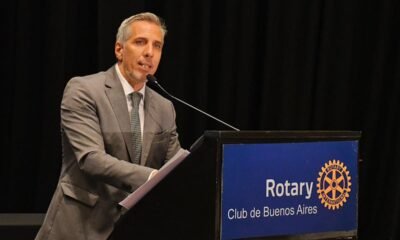INTERNACIONAL
UN’s atomic agency’s Iran policy gets mixed reviews from experts after US-Israel ‘obliterate’ nuclear sites
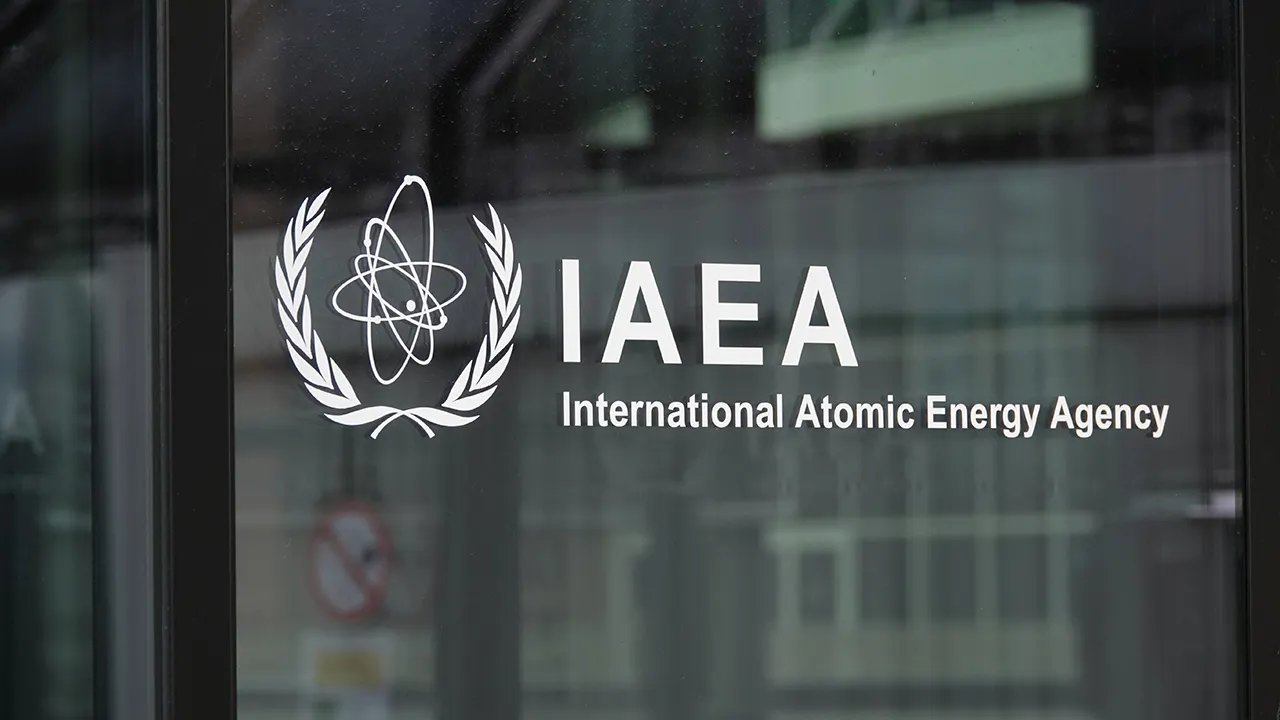
NEWYou can now listen to Fox News articles!
JERUSALEM – After 12 days of fighting, President Donald Trump and Israeli Prime Minister Benjamin Netanyahu declared victory against Iran’s nuclear program.
Trump declared three nuclear sites had been obliterated, as Netanyahu announced that Israel had «removed an immediate dual existential threat: both in the nuclear domain and in the area of ballistic missiles» – achievements the U.N.’s International Atomic Energy Agency (IAEA) failed to reach throughout some 20 years of monitoring Iran’s nuclear activities.
Dr. Or Rabinowitz, a nuclear proliferation scholar from the Hebrew University of Jerusalem and a visiting associate professor at Stanford University, told Fox News Digital that the IAEA «cannot, by itself, stop a country that wants to divert nuclear material and technology from its civilian program to its military program.»
EXPERT CONFIDENT IRAN’S NUCLEAR PROGRAM IS ‘NO LONGER’ AFTER MASSIVE US STRIKE
A map shows where Iran’s most important nuclear facilities are situated. (Fox News/FDD)
«It can warn, and that’s what it has been doing,» she said. «Sometimes these warnings led to United Nations Security Council resolutions, and sometimes they didn’t, but the IAEA by itself, can’t do more than that – it is only as strong as the board members and the countries that participate in it.»
Days before Israel launched its military assault on Iran with the aim of removing the nuclear – and conventional – weapons threat, the global nuclear watchdog reported that Iran had an estimated 408.6 kilograms (nearly 901 pounds) of uranium enriched to 60%, enough to make some nine nuclear bombs.
The report, which also criticized Iran’s lack of cooperation with the IAEA, prompted the agency’s board of governors, for the first time in 20 years, to declare that the Islamic Republic was in breach of its non-proliferation obligations.
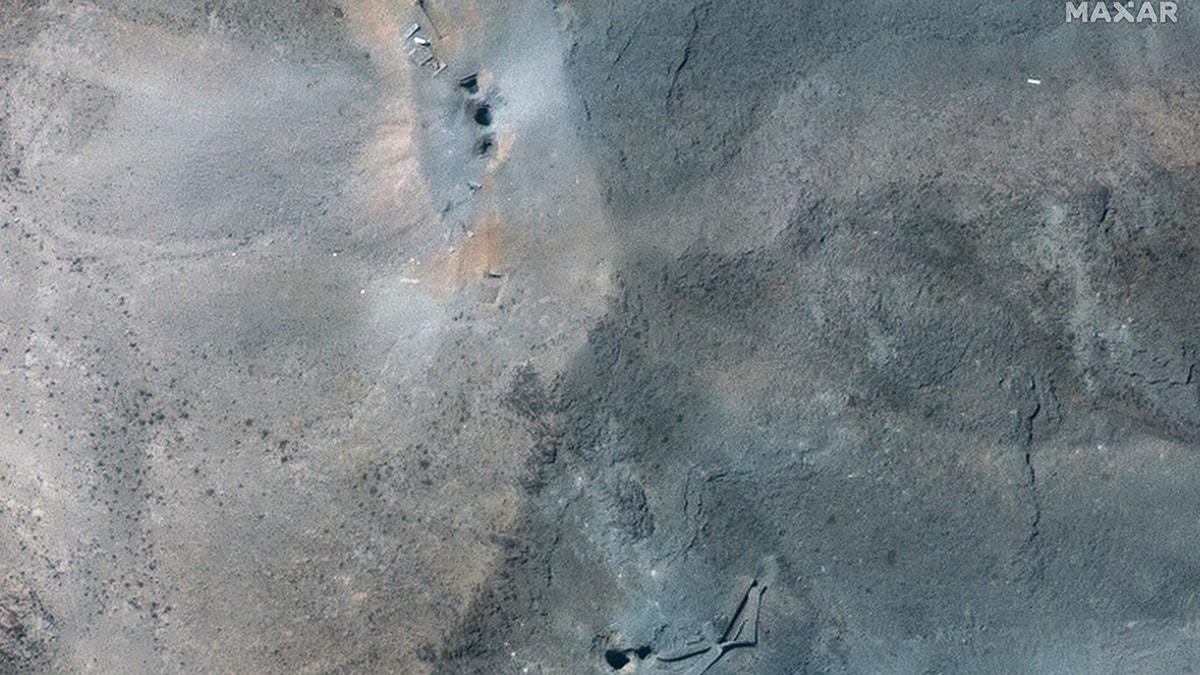
This satellite image provided by Maxar Technologies shows a close up view of holes and craters on a ridge at Fordow enrichment facility in Iran after U.S. strikes, Sunday, Jun. 22, 2025. (Maxar Technologies via AP) (Maxar Technologies via AP)
«We shouldn’t be surprised by this failure, and we should add to this failure, the failure of the United Nations,» said Dr. Yoel Guzansky, a senior fellow at the Institute for National Security Studies at Tel Aviv University.
Guzansky highlighted the fact that just a week ago, in the midst of launching hundreds of ballistic missiles into Israeli towns and cities, Iran’s Foreign Minister Abbas Araghchi addressed the U.N. Human Rights Council in Geneva.
UN NUCLEAR CHIEF SAYS IRAN HAS MATERIAL TO BUILD BOMBS, BUT NO PLANS TO DO SO
«Iran was welcomed there, and Israel was bashed,» he noted.
«It just shows that the U.N. system has long failed, and is long in need of remodeling, remaking, rebuilding,» Guzansky continued, adding that compared to other U.N. bodies, «the IAEA is fairly okay.»
«It’s not black and white, it has had some achievements, but it depends on what your expectations are,» he continued. «I don’t think anyone expected that the IAEA would entirely prevent Iran.»
Guzansky said that two decades of inspections and such reports had actually allowed Israel, and the U.S., to «gather intelligence and an understanding of Iran’s nuclear program» – a fact that was tested over the past week and a half.
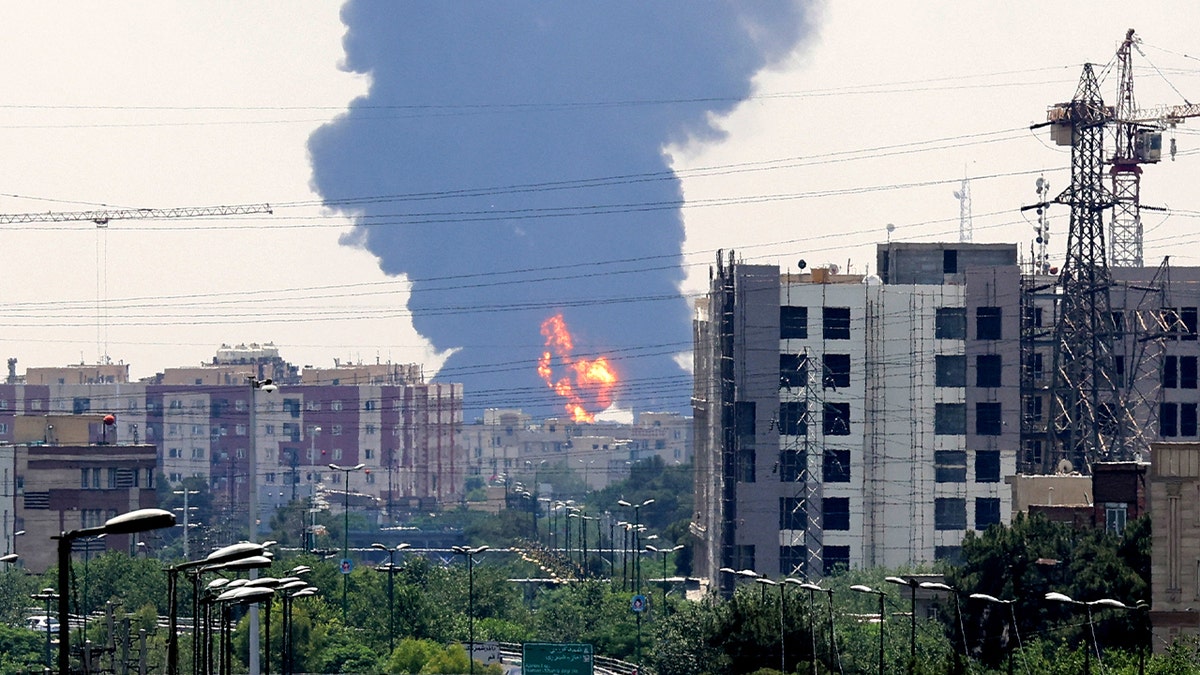
A massive plume of smoke and fire rise from an oil refinery in southern Tehran following reports that an overnight Israeli strike targeted the site on Jun. 15, 2025. (ATTA KENARE/AFP)
Iran has consistently maintained that all its nuclear activities were entirely peaceful and that it would never seek to develop or acquire nuclear weapons.
«The real problem here isn’t necessarily the IAEA, it’s that Iran has been cheating for 20 years and has not been playing a straight bat,» said Alan Mendoza, Executive Director of the Henry Jackson Society.
«Iran has been confusing and tricking and secretly developing programs, which the IAEA has not been able to access,» he said, adding, «so, in many ways, it’s not the IAEA fault, per se, it doesn’t have any enforcement capabilities — its job is just to monitor.»
Mendoza also said that Iran’s ability to advance its nuclear ambitions and enrich uranium to weapons grade level was «really the fault of the international community, rather than an agency.»
«This could have been cracked down upon years ago, as we have now seen, whether by military or other means, to actually force Iran into compliance,» he said.
«What this ultimately shows you is that when you have an international malefactor who continues to want to game the system, the only way to deal with them is to blow up the system and say, ‘Okay, you want to play it that way,’ well, here’s our response.»
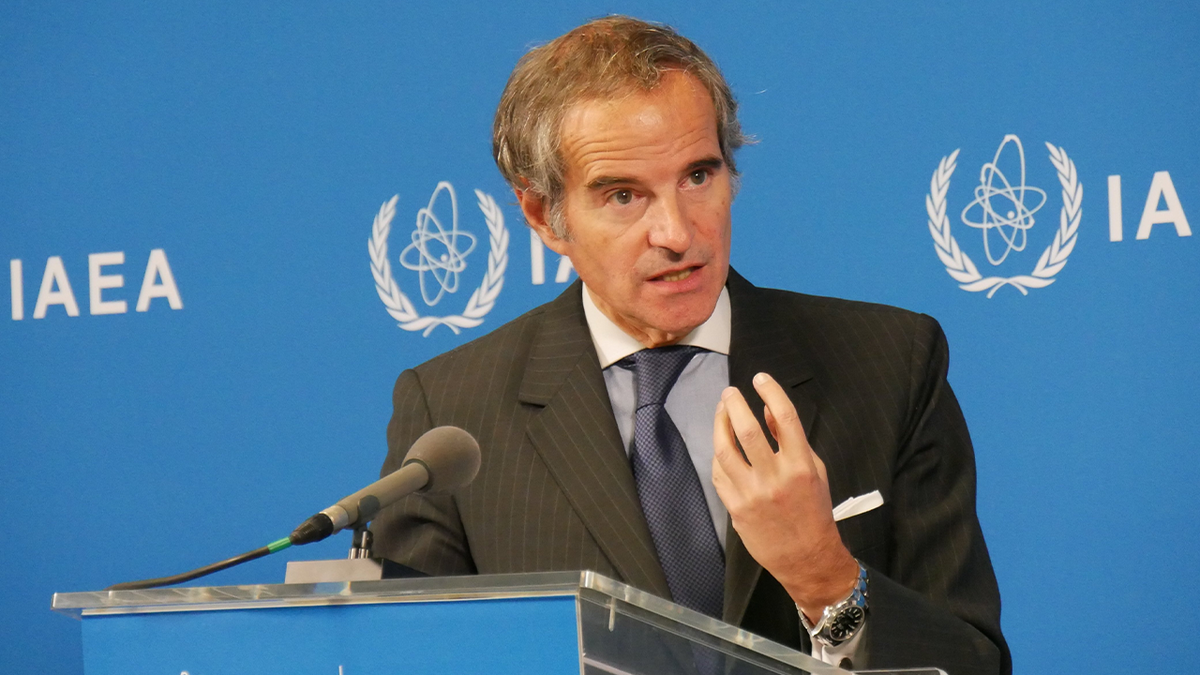
June 9, 2025; Austria, Wien: Rafael Grossi is increasingly concerned about Iran’s nuclear program. (Albert Otti/picture alliance via Getty Images)
IAEA DIRECTOR SAYS IRAN’S ENRICHED URANIUM CAN’T BE LOCATED FOLLOWING US MILITARY STRIKES
Despite the U.S. and Israel’s successful use of force, the IAEA has held back from commending their actions.
At an emergency session of the agency’s board members on Monday, Rafael Grossi, the IAEA’s Director General, was still urging diplomacy and warning that fighting risked «collapsing the global nuclear Non Proliferation regime.»
«There is still a path for diplomacy, we must take it, otherwise violence and destruction could reach unimaginable levels, and the global Non-Proliferation regime that has underpinned international security for more than half a century could crumble and fall,» he said, without a word about Iran’s lack of transparency and its clear violation of international agreements over more than two decades.
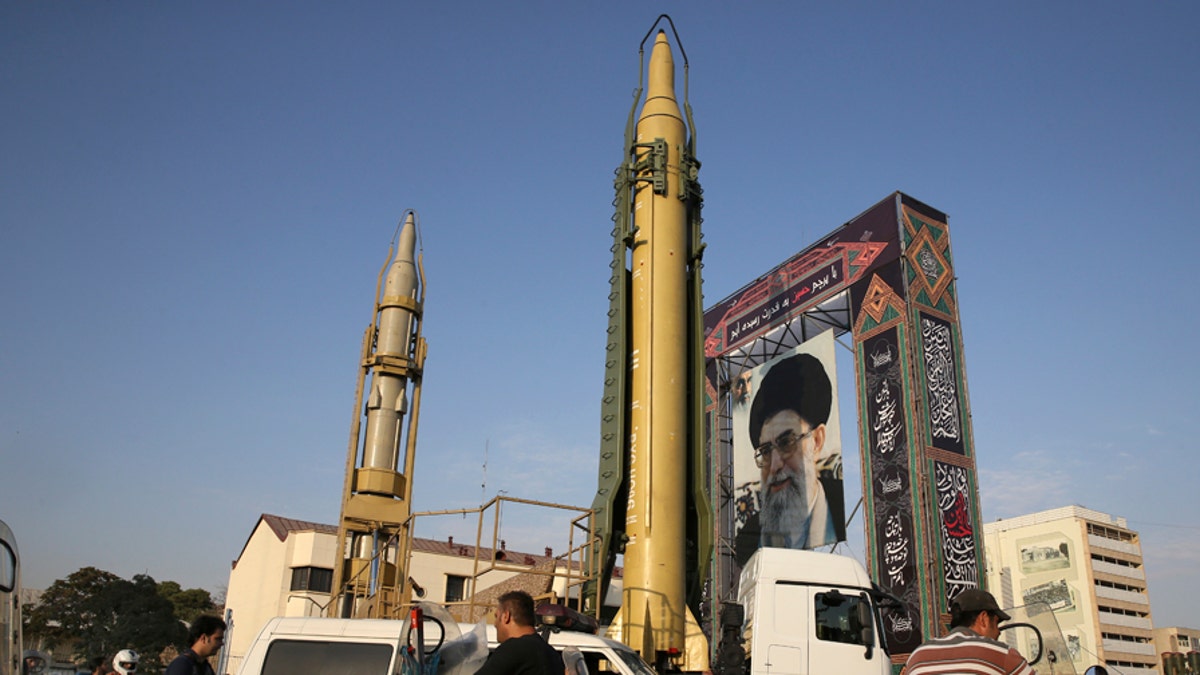
A Ghadr-H missile, center, a Sejjil missile and a portrait of the Iranian Supreme Leader Ayatollah Ali Khamenei are on display for the annual Defense Week, marking the 37th anniversary of the 1980s Iran-Iraq war, at Baharestan Sq. in Tehran, Iran, Sunday, Sept. 24, 2017 (AP)
But on Tuesday, two days after the U.S. military carried out massive precision strikes on three key nuclear sites in Iran, Grossi told Fox News’ Martha MacCallum that his agency did not know where nearly 900 pounds of potentially enriched uranium is now located, after Iranian officials said it had been removed for protective measures ahead of the US strikes on nuclear facilities in Iran.
CLICK HERE TO GET THE FOX NEWS APP
«Like all the international bodies who have been condemning US and Israeli action, these organizations exist for the purpose solely of diplomacy,» Mendoza said, adding, «The agency doesn’t have any military function. It has no recourse to it. It can’t call for it, so, if you think about it, all they’re doing is merely protecting their position within the international system.»
Requests for a response from the IAEA were not immediately answered on Wednesday.
INTERNACIONAL
Trump to jet off to Asia as North Korea fires ballistic missiles and China trade questions loom

NEWYou can now listen to Fox News articles!
President Donald Trump is heading off to Asia Friday evening, not long after North Korea fired off a ballistic missile for the first time in months and as questions loom regarding trade negotiations with China.
The White House confirmed that Trump will meet with Chinese President Xi Jinping Thursday during the Asia-Pacific Economic Cooperation (APEC) Summit.
The meeting comes amid escalated tensions between the two countries on trade after Beijing announced Oct. 9 it would impose export controls on rare-earth magnets, which are used in a host of products ranging from electric cars to F-35 fighter jets. In response, Trump announced the U.S. would impose a new 100% tariff on all Chinese goods, which is slated to take effect Nov. 1.
Even so, Trump sought to diffuse tensions and has routinely touted his relationship with Xi in recent weeks. Additionally, he has voiced confidence both parties will walk away from the summit pleased and that a deal will be made.
TRUMP THREATENS ‘MASSIVE’ CHINA TARIFFS, SEES ‘NO REASON’ TO MEET WITH XI
The White House confirmed that President Donald Trump will meet with Chinese President Xi Jinping Thursday during the Asia-Pacific Economic Cooperation Summit. (Jonathan Ernst/Reuters)
«I think we are going to come out very well, and everyone’s going to be very happy,» Trump said Thursday.
The summit between Trump and Xi will mark the first time they’ve met in person since Trump took office in January. The two previously met in person in June 2019 in Japan.
Trump’s meeting with Xi will come on the tail end of a larger trip to the region. Trump is first headed to Malaysia to meet with Malaysian Prime Minister Anwar Ibrahim Sunday afternoon before participating in the Association of Southeast Asian Nations (ASEAN) dinner in the evening.
NORTH KOREA LAUNCHES BALLISTIC MISSILES DAYS BEFORE TRUMP’S VISIT TO THE PENINSULA
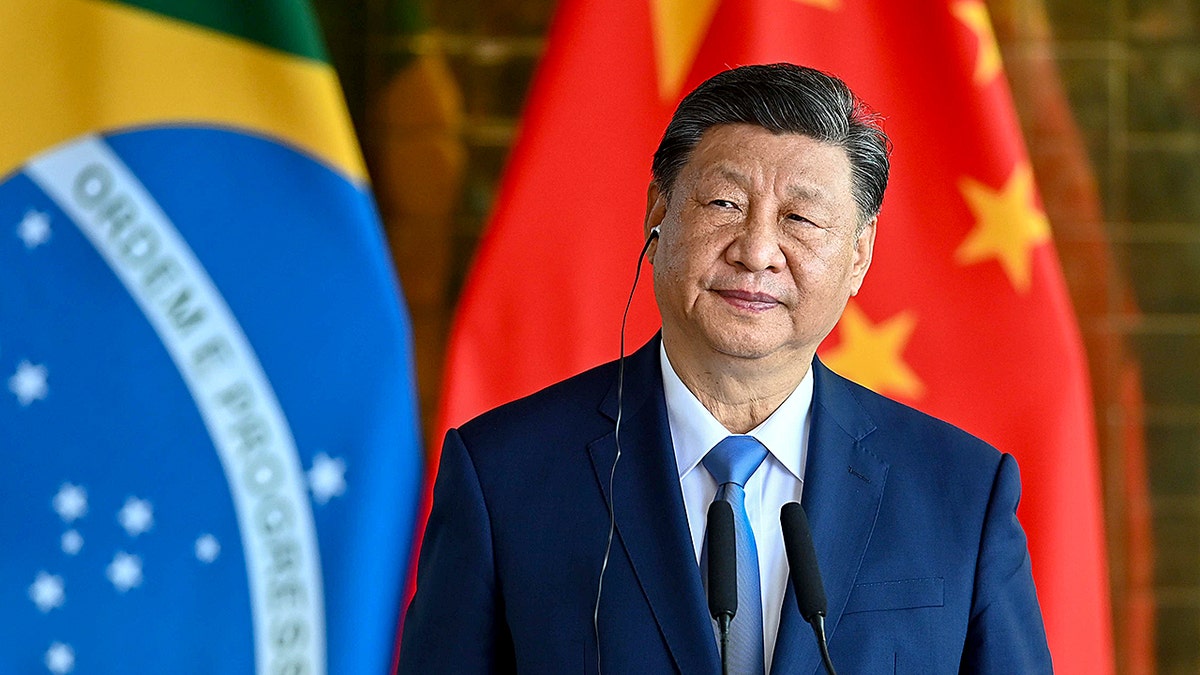
Xi Jinping, China’s president, during a news conference with Luiz Inácio Lula da Silva, Brazil’s president, not pictured, at the Alvorada Palace in Brasilia, Brazil Nov. 20, 2024. (Ton Molina/Bloomberg via Getty Images)
While in Malaysia, he will also meet with Cambodian Prime Minister Hun Manet and Thai Prime Minister Anutin Charnvirakul.
Trump will then head to Tokyo Monday and is slated to meet on Tuesday with Japanese Prime Minister Sanae Takaichi, who was just elected earlier in October. Takaichi is the first woman to serve as the prime minister of Japan.
Trump will then close out his trip heading to South Korea, where he will meet with the South Korean President Lee Jae Myung and will deliver keynote remarks at the APEC CEO lunch.
TRUMP ANNOUNCES MEETING WITH XI JINPING AT SOUTH KOREA APEC SUMMIT SCHEDULED FOR NEXT MONTH
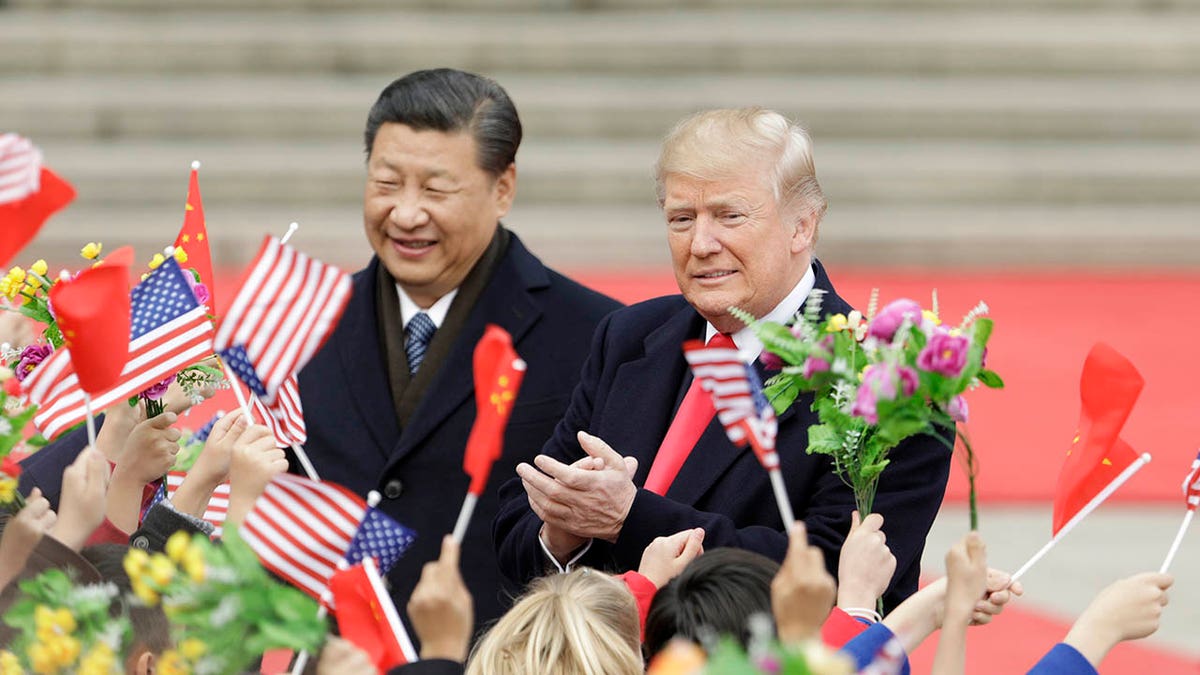
President Donald Trump, right, and Xi Jinping, China’s president, greet attendees waving American and Chinese national flags during a welcome ceremony outside the Great Hall of the People in Beijing, China, Nov. 9, 2017. (Qilai Shen/Bloomberg via Getty Images)
Trump is scheduled to return to Washington Thursday.
Meanwhile, North Korea has upped its aggression in recent days, firing off multiple short-range ballistic missiles Wednesday, the first one Pyongyang has launched since May. Meanwhile, North Korean Leader Kim Jong Un showed off a new intercontinental ballistic missile at a military parade in front of Chinese, Russian and other top officials Oct. 10.
«We are aware of the DPRK’s multiple ballistic missile launches and are consulting closely with the Republic of Korea and Japan, as well as other regional allies and partners,» U.S. Indo-Pacific Command (INDOPACOM) said in a statement on Wednesday.
«The United States condemns these actions and calls on the DPRK to refrain from further unlawful and destabilizing acts,» INDOPACOM said. «While we have assessed that this event does not pose an immediate threat to U.S. personnel, or territory or to our allies, we continue to monitor the situation.»
The Associated Press contributed to this report.
white house,donald trump,south korea,japan,china
INTERNACIONAL
Rodrigo Paz prometió “poner a Bolivia en el mundo” y busca más apoyo externo en plena transición

El presidente electo Rodrigo Paz manifestó este viernes que está “recuperando el rol de Bolivia en el mundo” en sus primeros días tras confirmarse su triunfo en el balotaje de las elecciones presidenciales, celebrado el domingo. En un mensaje difundido a través de sus redes sociales, Paz describió el “trabajo arduo” que ha realizado desde que el órgano electoral comunicó los resultados preliminares que lo daban como vencedor de los comicios.
Entre los primeros compromisos de su mandato, Paz subrayó la necesidad de “poner a Bolivia en el mundo y el mundo en Bolivia”, una gestión que, según explicó, ha implicado tomar decisiones clave y mantener comunicaciones “nacionales e internacionales”. El presidente electo agradeció el respaldo de jefes de Estado y líderes políticos que lo felicitaron por su victoria, incluyendo la “apertura de naciones” y lo describió como un “gran” gesto de Estados Unidos y de organismos multilaterales que prometieron cooperación para ayudar a Bolivia a hacer frente a la escasez de combustibles.
Además, Paz aseguró que, durante el proceso de transición, se ha buscado que distintas fuerzas políticas entiendan que “es a través de la democracia y reconociendo resultados” como se genera “unidad y fortaleza”.
Llamó a trabajar “en equipo” para abordar la crisis económica que atraviesa el país y señaló que se ha dado un “mensaje claro” orientado a conocer el funcionamiento interno de cada ministerio y entidad estatal, en la perspectiva de “ordenar la casa” para mejorar la “economía de la gente”. Destacó que el esfuerzo de su equipo se ha desarrollado “prácticamente sin dormir” tras conocer la magnitud del desafío.
El mandatario electo expresó que en su gestión participarán quienes “quieran ayudar a la patria de forma honesta y sincera y que quieran ponerle el hombro” a Bolivia para “salir adelante”. El cómputo oficial finalizó el miércoles y ratificó la victoria de Paz, quien alcanzó el 54,96% de los votos, frente al 45,04% de su rival, el ex presidente Jorge “Tuto” Quiroga.
El reconocimiento al triunfo de Paz llegó de distintas figuras políticas, incluyendo al presidente saliente Luis Arce, ex mandatarios, opositores y gobiernos de otros países latinoamericanos y europeos. Paz asumirá el cargo el 8 de noviembre, fecha para la cual se estableció una comisión de Transmisión de Mando Presidencial entre los equipos de Arce y Paz, encargada de organizar los actos oficiales de investidura. Paralelamente, se constituyó otra comisión para la Transición de Gobierno, encargada de coordinar la entrega de informes y documentación oficial entre las autoridades salientes y entrantes.
Por su parte, “Tuto” Quiroga anunció el miércoles que no obstaculizará en la Asamblea Legislativa al gobierno de Paz, con el objetivo de permitirle aplicar su plan anticrisis. En conferencia de prensa, Quiroga afirmó que “Paz tiene derecho a designar a las personas que considere más capacitadas para presidir las cámaras de diputados y senadores” y pidió a los legisladores de su partido respaldar tales decisiones, argumentando que el apoyo se debe manifestar “no con discursos, sino con votos”.
En el Congreso, el Partido Demócrata Cristiano de Paz se consolidó como la primera fuerza política, seguido de Alianza Libre de Quiroga. El presidente electo informó, además, sobre contactos con otras fuerzas, como Alianza Unidad y Súmate, mientras Quiroga aseguró que su respaldo a la gobernabilidad no depende de un acuerdo de coalición.
Las protestas también marcaron la semana postelectoral, con jóvenes marchando para exigir una auditoría de los resultados. Aunque la Alianza Política de Quiroga solicitó la publicación de 34 actas de votación, el propio ex mandatario reconoció que, pese a errores que suelen presentarse en los procesos electorales, “nada hubiera cambiado el resultado” debido a la “brecha de casi nueve puntos” entre ambos candidatos. Observadores internacionales de la Unión Europea y la Organización de Estados Americanos (OEA) validaron el resultado de la elección.
Por otro lado, en el ámbito diplomático, la Alianza Bolivariana para los Pueblos de Nuestra América (ALBA) anunció este viernes la suspensión del gobierno entrante de Bolivia, que asumirá Paz en noviembre, por considerar inaceptables sus declaraciones “proimperialistas y colonialistas” respecto a Cuba, Venezuela y Nicaragua. Según el comunicado difundido por la cadena Venezolana de Televisión, la suspensión “no afecta los vínculos permanentes, afectivos y solidarios” con el pueblo boliviano.
Bolivia había ingresado a la ALBA en 2006 y mantenía relaciones estrechas con países como Venezuela durante los gobiernos de Evo Morales y Luis Arce. En declaraciones a la agencia EFE, Paz delineó su política exterior, señalando que su administración establecerá relaciones internacionales con países “que tengan la democracia como principio” y manifestó su interés en “retomar las relaciones con Estados Unidos”, rotas a nivel de embajadores desde 2008, cuando Morales expulsó al entonces embajador estadounidense, hecho que la Casa Blanca siempre negó.
El mandatario electo subrayó que, aunque existen representaciones diplomáticas de Venezuela en Bolivia, no comparte “la modalidad democrática” del régimen de Nicolás Maduro. De esta manera, la transición política y los movimientos diplomáticos perfilan un inicio de gestión marcado por la búsqueda de consensos internos y la redefinición de la política exterior boliviana.
(Con información de AP y EFE)
Elections,South America / Central America,Elections / Voting
INTERNACIONAL
German chancellor defends remarks on migrants suggesting citizens ‘afraid to move around in public spaces’
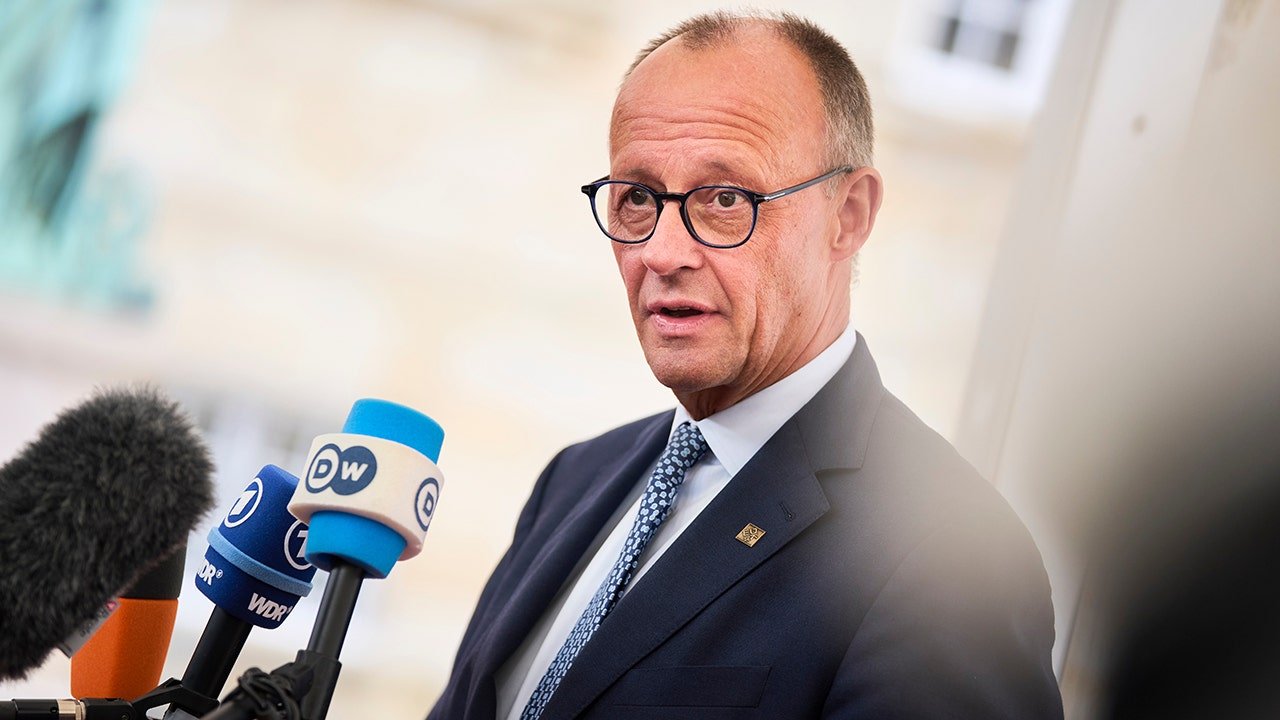
NEWYou can now listen to Fox News articles!
German Chancellor Friedrich Merz has doubled down on comments he made about migration, saying many Germans and Europeans are «afraid to move around in public spaces.»
Merz has rejected criticism from some German political circles over his government’s tough stance on illegal immigration.
«But we still have this problem in the cityscape, of course, and that’s why the federal interior minister is facilitating and carrying out large-scale deportations,» he said during a visit to Potsdam last week.
GERMANY BRACES UNDER COLLAPSING GOVERNMENT AND LOOMING TRUMP TRADE WAR
German Chancellor Friedrich Merz sparked backlash while remarking about the country’s migration policies. (Thomas Traasdahl/Ritzau Scanpix via AP)
The statement prompted backlash, some accusing the German leader of being racist. He rejected the criticism while on the sidelines of a summit on the Western Balkans in London, saying migrants were «an indispensable part of our labor market,» German-based DW News reported.
He also claimed that many people in Germany and across Europe are nonetheless «afraid to move around in public spaces» because of migrants «who do not have permanent residence status, do not work and do not abide by our rules,» the outlet reported.
MD GOV DEFENDS $190K TRUMP-CENTRIC IRISH CONSULTANT CONTRACT AS POTUS MOVES IN NEXT DOOR
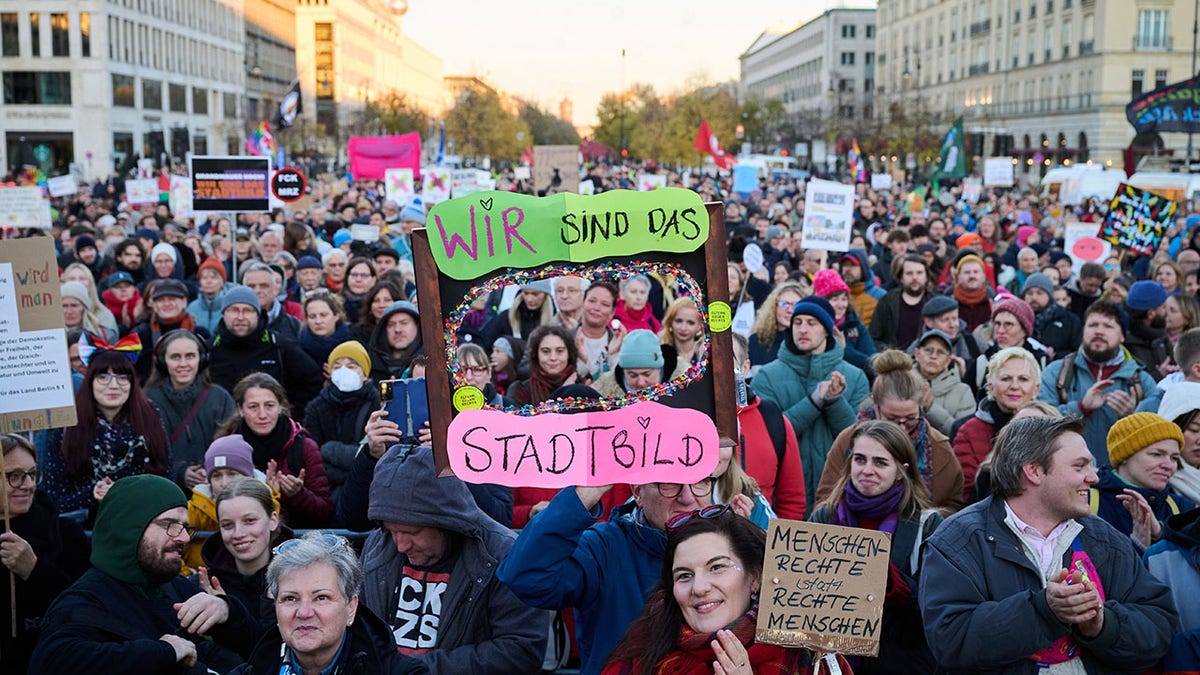
Numerous demonstrators gather for a demonstration in Berlin Oct. 19, 2025, with the slogan «Brandmauer hoch!» («We are the cityscape»), referring to a statement made by Chancellor Merz in reference to migration policy. (Annette Riedl/picture alliance via Getty Images)
«I don’t know whether you have children. If you do, and there are daughters among them, ask your daughters what I might have meant. I suspect you’ll get a pretty clear and unambiguous answer. There’s nothing I need to retract,» he said when asked if he would withdraw his earlier remarks.
Some have signed a petition disputing Merz’s comments. The signees include actor Marie Nasemann and environmental activist Luisa Neubauer.
CLICK HERE TO GET THE FOX NEWS APP
«There are approximately 40 million daughters in this country. We have a genuine interest in ensuring that our safety is taken seriously,» Neubauer wrote on Instagram. «What we are not interested in is being misused as a pretext or justification for statements that were ultimately discriminatory, racist and deeply hurtful.»
germany,illegal immigrants,europe

 CHIMENTOS3 días ago
CHIMENTOS3 días agoAdabel Guerrero confesó de qué famosa está enamorada y que le encantaría tener relaciones: «La China Suárez me sorprendió con su belleza»

 DEPORTE2 días ago
DEPORTE2 días agoUniversidad de Chile vs. Lanús, por la Copa Sudamericana: día, horario y cómo verlo por TV

 POLITICA2 días ago
POLITICA2 días agoDiego Luciani, sobre la condena a Cristina Kirchner: “No hay sentencia ejemplar sin recuperar lo robado”













